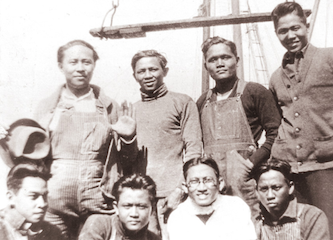
Manong Generation. The first major wave of Filipino immigrants to the United States during the 1920s and 1930s. These pioneers, primarily young single men, sought economic opportunities in America, driven by the Philippines‘ status as a U.S. territory at the time.
The term ‘manong‘ comes from the Ilocano language and means “elder brother,” symbolizing respect and affection. This generation played a significant role in shaping Filipino American history, enduring racial discrimination, economic hardship, and legal barriers while contributing immensely to the agricultural and labor movements in the U.S.
The Manong Generation worked primarily in agriculture, fishing, and canneries, often under grueling conditions. They were instrumental in organizing labor strikes and unions, such as the Agricultural Workers Organizing Committee (AWOC), which later merged with Cesar Chavez‘s National Farmworkers Association to form the United Farm Workers (UFW).
Despite facing anti-miscegenation laws and immigration restrictions like the Immigration Act of 1924, they built vibrant communities such as Little Manila districts in cities like San Francisco.
Their legacy is marked by resilience and activism, paving the way for future generations of Filipino Americans to thrive in various professional fields. Today, their contributions are commemorated through monuments, oral histories, and Filipino American History Month celebrations.
#ManongGeneration, #FilipinoAmericanHistoryMonth, #FilipinoAmerican, #FAHM, #FilAmHistory, #PinoyPride, #AsianAmericanHistory
Tags: Filipino Immigration, Labor Movement History, Agricultural Workers Organizing Committee (AWOC), United Farm Workers (UFW), Civil Rights Movement, Filipino American Heritage